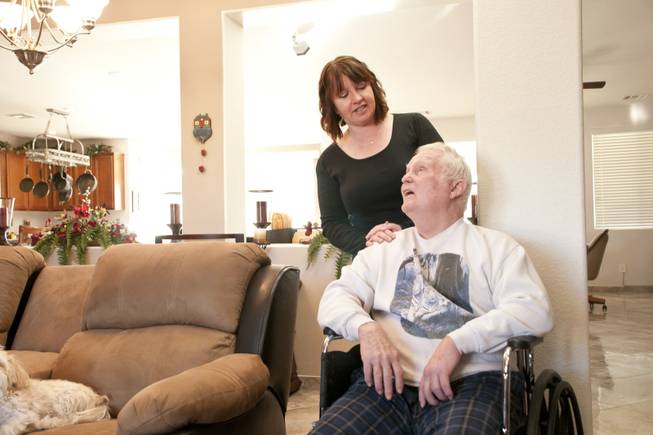
Patricia Davey, a local schoolteacher, uses the Teachers Health Trust to care for her husband Charles. Dismantling the Teachers Health Trust would mean Patricia would have to pay out of pocket for her husband’s costly treatments.
Thursday, Nov. 3, 2011 | 2 a.m.
Sun Archives
Sun coverage
Like many teachers during the boom years, Patricia Davey was lured to Las Vegas by the enticing benefits offered by the Clark County School District.
Things were different back in 1997. The population was booming and Las Vegas was flush with money. The School District was on the precipice of building more than 100 new schools to address the burgeoning student enrollment.
To fill those new classrooms, teachers were recruited from throughout the country. As an incentive to work for the School District — now the largest employer in Nevada — Davey received a signing bonus, and a higher salary, better pension and health care plan than her old job in Kansas.
It was a “sweetheart deal” too good to pass up for the 50-year-old special education facilitator at Palo Verde High School.
Fast-forward 14 years. In the midst of the worst recession in more than half a century, the School District slashed salaries and passed onto employees an increase in pension costs. However, in the midst of the cutbacks, one benefit from the boom era remained largely untouched: the Teachers Health Trust.
That might change this year.
As the teachers union enters into arbitration with the School District over contract negotiations, teachers are afraid their nonprofit health insurance company might be replaced by a for-profit company that they say might drive up their premiums and offer less coverage than their current plan.
“I’m OK with sacrifices because everyone has to sacrifice (in this economy),” Davey said. “But when you’re talking about the health and life of loved ones, you shouldn’t have to sacrifice.”
•••
The Teachers Health Trust was created 28 years ago after three major health premium increases over two years under the former District-managed plan. Startled by the sudden increase in health insurance costs, the teachers union negotiated with the School District in 1983 to create a health trust that would cater specifically to the 18,000 licensed employees in the district.
With about 35,000 people — teachers and their families — on its plan, the health trust was able to negotiate for lower rates and attract a large network of 8,000 health care providers, said the trust’s CEO, Peter Alpert.
“We’re by teachers, for teachers,” he said. “We’re proud of what we do, and teachers appreciate what we’re doing. I don’t think teachers would be served well by another company.”
This year, the cash-strapped district — facing multimillion-dollar budget cuts — proposed changing health care providers to save costs. The district spends about $10 million per month on health insurance for its teachers, Alpert said.
The proposal was met with stiff opposition from the teachers union. An in-house survey of union members found that more than 95 percent of teachers surveyed were content with their current health plan, union president Ruben Murillo said.
“Who would want to work for a district that takes away your salary, pension and health care benefits?” Murillo said at a recent health fair held for teachers by the trust. “If you want to recruit the best teachers, you have to offer the best benefits. A healthy teacher equals a health classroom.”
The School District, which does not comment on contract negotiations, has not announced an alternative health insurance plan to replace the health trust. In September, Clark County Schools Superintendent Dwight Jones sent a memo to employees, explaining the district’s position and addressing some questions teachers have raised.
“The District believes that if teachers become part of the insurance program for all employees, the District can provide better benefits at a lower cost,” Jones wrote in the memo. “Savings to the taxpayers are in the millions of dollars, monies which will be used to offset lost positions and potential salary cuts, and to fund District programs and operations that enhance student achievement.”
His answers did little to quell fears however, as dozens of teachers packed School Board meetings and mobilized a campaign to voice their concerns.
“We want CCSD to know the impact this will have on the livelihood of teachers,” Murillo said. “People don’t go into this profession to get rich. They just expect a fair salary and benefits.”
•••
In January, Patricia Davey’s husband, Charles, collapsed in the bathroom of their northwest valley house. Charles, 76, had suffered a stroke, whereby blood flow to part of the brain is blocked.
In Charles’ case, the blockage occurred in the brain stem, a delicate area of the nervous system that controls the heart and lungs.
Charles was initially transported to Mountainview Hospital, but was transferred to Sunrise Hospital, which is the only hospital in the valley with a stroke center that could treat a brain stem tumor, according to hospital officials.
Charles spent two weeks in the hospital after doctors placed a coronary stent to open up his blocked artery. With a $2,000 ambulance ride, the doctor’s bill, lab work, tests and about four months of rehabilitation, the Daveys were looking at a bill of about $400,000.
“There’s no way we could have afforded that out of pocket,” Patricia said.
With their health care plan under the Health Trust, the Daveys ended up paying just $5,000 out of pocket. They didn’t have to fight their insurance company for coverage, which surprised them.
Because the Health Trust is local, their questions could be answered with a phone call or a visit to their central Las Vegas office. The Daveys were also assigned a case manager who walked them step-by-step through every procedure and payment.
“I’d be in a nursing home if it weren’t for the Health Trust,” Charles said. “Those people are wonderful. They saved my life.”
Patricia, who makes about $70,000 annually, said she isn’t worried so much about health care premiums possibly going up under another plan, but rather, she is worried about what kind of coverage she might receive.
Sunrise Health Systems — which operates Sunrise, Mountainview, Southern Hills and Sunrise Children’s hospitals — is out of network for the School District’s support staff, which uses Sierra/UnitedHealth Insurance, a private company.
If the School District decides to move teachers under the same health care plan as its support staff counterparts, Patricia is worried she may no longer have access to Sunrise’s health services — including their nationally recognized primary stroke center.
Because stroke victims are more likely than others to have a repeat stroke, Patricia is worried she might be paying out of pocket should Charles suffer another attack in the brain stem region.
“If he has another stroke, we might be looking at bankruptcy,” she said. “If (the district) takes our health trust away, they would be putting money above the health of teachers and their families.”
•••
Part-time kindergarten teacher Amy Urrea also shares similar concerns about her health insurance. Her 11-month-old daughter, Ava, was born with a congenital heart defect that has required 14 surgeries, including three open-heart surgeries, 10 heart cauterizations and a feeding tube insertion.
“Emotionally, I was a wreck,” she said. “It’s been quite a roller coaster ride.”
Urrea said the health trust was able to bring the $2 million cost of Ava’s health care down to about $7,000 out of pocket. However, because Ava’s health defect isn’t curable, her mother is looking at ever-mounting costs until Ava receives a heart transplant.
That could take a while, Urrea said. Infant heart donations aren’t easy to come by, she said.
Having a local case manager from the health trust help her navigate through the health care system was “wonderful,” he said. It helped her stay focused at work, knowing that her daughter’s needs were cared for.
However, like the Daveys, Urrea is worried she may lose access to the Sunrise Health System. Ava was treated at Sunrise Children’s Hospital, which has the only pediatric open-heart program in Nevada.
Having to change doctors and cardiologists would be difficult, Urrea said.
“I don’t feel like I have control over what’s happening with my health insurance,” she said. “It’s stressful thinking about losing services and having to spend more time and energy to get the treatment Ava needs. I just want my baby to be OK.”


Join the Discussion:
Check this out for a full explanation of our conversion to the LiveFyre commenting system and instructions on how to sign up for an account.
Full comments policy